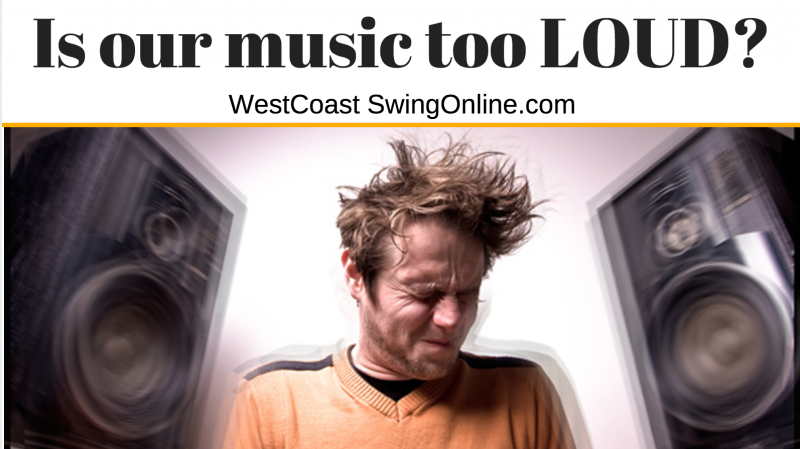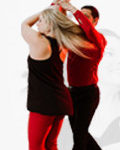Last April I came across a post from Shaun Wall. He is an audio engineer and dancer from Denver, Colorado. He wrote a facebook post concerning the level of music being played at dance conventions and events around the world. I thought it was a fascinating topic and I appreciate the care with witch he wrote his post. I spoke to him briefly online and wanted to interview him about the subject but schedules just didn’t mesh and the topic slipped my mind. Now, I want to share it!
Below is the transcript of his facebook post. I added some titles in red to make it easier to consume but the rest is word for word his…Thanks Shaun for sharing!
Looking for good West Coast Swing music? Check our WCS Music Page
Shaun’s thoughts…
For years I have considered writing an article on the topic of audio levels and hearing preservation for dancers and organizers. As an audio engineer for 17 years and having traveled the world doing sound, I finally have a moment to address this matter of concern.
Hearing damage is permanent–until someone invents nanobots to restore cilia function. According to NIOSH standards, here are the decibel level exposure recommendations to avoid damage:
A-weighted, slow response
85 dB 8 hours
88 dB 4 hours
91 dB 2 hours
94 dB 1 hour
97 dB 30 minutes
100 dB 15 minutes
103 dB 7.5 minutes
Etc.
Over the years, I have consistently measured sound at dance events between 95-100 dB. This means that permanent damage begins between 2-6 songs into a set. And that’s if you start at a zero baseline for the day. What people don’t realize is that damage doesn’t just occur at loud levels, but is also to time of exposure.
A loud bar.
If you’re in a loud bar (91 dB) for two hours straight, then you are beginning to permanently damage your hearing. Generally, it’s starts in the high frequency so you don’t really notice. If you walk away from a concert or live performance and you hear ringing or everything feels cottony and muffled, you have done some amount of damage. Very likely much of your hearing will come back, but you may be missing pockets of different frequency ranges and honestly, some of it just won’t come back.
The upshot of this is you will have trouble hearing your grandkids. Thinking about this now will prevent lots of frustration later in life as being disconnected from one of our major senses greatly impacts quality of life as we age.
On the topic of prevention, I want to address symptoms and causes of abusive sound levels.
Protect your ears
The easiest symptom to address is fatigued hearing: use hearing protection. There are all sorts of ways to do this–and no, paper towels or cotton in the ears don’t help at all. (More on those physics in a later post).
From $2 foam ear plugs to $150 custom molded plugs, each serves a purpose. The cheaper earplugs offer the most protection, but come at the cost of sound quality. Foam plugs block high frequencies which makes it tough to hear articulation. There are musician ear plugs called etymotic ear plugs that offer a balance of protection while maintaining quality. These run from $15-$75 and are of varying quality. I believe this is the minimum investment necessary for enjoyment and protection, especially for dancers.
Beyond that, you can go to an audiologist and have a mold of your ear canals made. This costs about $50-60 and then you send that mold to a company that specializes in custom earplugs. These usually cost $100-150 and offer the best protection along with the most retention of the sound. They are called frequency flat because they suppress sound waves over all audible frequencies equally.
These also allow for different levels of decibel attenuation, which means making sound quieter. Remember, sound is simply air pressure that moves at a certain rate. The pair I use professionally have 9, 15, and 25 dB attenuators. If you reference that list above with time vs. damage, you can select which level of attenuation you want and still keep your hearing safe while the concert still feels “loud.”
Remember, those exposure levels come from the idea of just waking up and having “fresh” ears. If you’ve been at work in a loud environment or in a loud restaurant, then your time of exposure before damage is decreased.
The first line of defense is hearing protection.
Why so loud?
On to the causes:
The next line is speaking with the organizer to ask the sound engineers or DJs to bring the volume down to appropriate levels. This can sometimes be tough due to political reasons, ego, or ignorance on the subject. It’s not easy to tell anyone to “turn down” and have it not land harshly. DJs tend to want to “feel” the music and that’s totally fair. What’s not fair is that when you can feel it in the back of the room where the DJ or sound board is, it means that the sound pressure level on the dance floor is at unacceptable levels.
Sometimes, bands have their amplifiers far too loud and there is nothing that the sound engineer can do. In this case, many times, the band’s instruments aren’t even being sent through the PA. The issue is this: for vocals to be heard, they have to be LOUDER than the instruments on stage. When the issue lies with the band, egos tend to get really involved. There is definitely sound logic to things being loud.
We hear more evenly at higher levels and tube electronics sound best when they are being driven hard. What’s difficult is if a band is unaware that they are permanently harming dancers and concert attendees in the name of “tone.”
When I was an organizer for the Fusion Exchange, we built in safe decibel policies into our contracts. If any of our bands went above a specified stage volume, they would be asked to turn down. If they refused, they were in breach of contract, fired on the spot, and we were no longer legally obligated to pay them. That’s how serious the FX crew and leadership were about preserving our attendees hearing. We never had to do that.
Set the tone.
A simple chat with bands who respected their audience and considered their impact went a long way to preventing putting anyone in that predicament.
I’m personally sick of bands hurting my friends and dance family. Awareness is the best thing we can do to ensure everyone’s sanity and safety.
It all starts with the stage and hiring conscientious bands who understand dynamic range and their audience’s needs. We are not there to scream and yell. We are not there to have our hearing mutilated. We are not there to have our future enjoyment stripped from us. We are there to dance and feel the pulse and listen to words of many sinner sages. And that can be done at safe and enjoyable levels for everyone.
If you’re an organizer, I’m more than happy to help you write contracts that protect you and your attendees and keep bands aware of what we’re hiring them to do for us. And seriously, if a band doesn’t respect your attendees, fire them. They are physically harming your scene. You wouldn’t let someone slowly scar your eyeball over years and years until you couldn’t see. Why do you let bands do that to your ears?
If you’re a dancer and simply want more information about hearing and hearing protection, feel free to pm me and I will gladly point you in the direction of knowledge.
Most importantly, educate yourselves, your friends, your scene organizers, and the bands you hire that you want to be able to hear your grandkids (or your friends when you get old, whatever your preference may be).
Hearing loss has been linked to Alzheimer’s and other degenerative diseases as the perception of language stimulates the brain in specific ways our whole lives. Losing that, we literally lose a part of our brain and a part of ourselves.
I plan on writing more and if there are any topics you’d like me to address or are scene specific, please let me know.
Feel free to tag any friends, organizers, engineers, or bands that you’d like to have this very basic primer. There are of course much higher levels of accuracy in what I’m purporting.
I will be addressing that in subsequent posts.
Shaun Wall
Hey I wanna give you something for FREE!
Each week I send out a FREE move of the week video via email. (OK maybe not EVERY week…sometimes I’m lazy.)
Some weeks it’s a pattern, some weeks it’s a technique tip, but either way its something about WCS that you’ll LOVE!
I want you to get these awesome videos! You can sign up for them here…





 Brian & Megan
Brian & Megan
Dear Brian,
thank you for sharing this! Since 15 years I suffer from hearing loss I got after an extremly loud african drum concert. After the concert I felt deaf and unfortunately my hearing didn’t recover. Now I struggle with hearing aids, but it is very disappointing that I cannot hear high frequencies any more; eg. the upper ten keys of my piano are dead… Therefore I have big problems with understanding, espacially my WCS dancing teacher ;-(
BTW: do you plan to come to germany in near future?
Best wishes from Augsburg, Southern Germany
Hi Manfred,
Yes its a subject I had not give much though to until it was brought to my attention. I think is something that needs to be understood and considered for exactly the reasons you bring up. I’m sorry to hear about your hearing issues. Hopefully we can bring light to the situation and help others. Thanks for sharing your story! -Brian